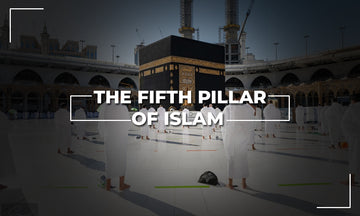Numerous Islamic sources, such as the hadith of Gabriel and the Quran (the book of holy and divine revelations), provide descriptions of the Five Pillars of Islam. Because Allah only requires his followers to fulfill five obligations. Muslims are required to declare their trust in Allah, offer five times a day prayers, give charity to the poor, fast during the month of Ramadan, and go to Makkah once in their lifetimes.
The Islamic faith is based on five fundamental principles, or the Five Pillars. They are as follows:
-
Shahada (Belief Declaration)
-
Salah (Gratitude)
-
Zakat, or alms-giving
-
Sawm (fasting) and Hajj (voyage)
-
Hajj (Pilgrimage)
What is The Fifth Pillar of Islam?
The Fifth and Last Pillar of Islam, the Hajj, is a holy journey that is extremely important to Muslims worldwide. For those who are financially and physically capable, visiting the Holy City of Makkah on a spiritual level at least once in their lives is a requirement. Muslims are united in their faith and devotion to Allah through the Hajj, which is more than just a physical task but also a profound spiritual experience.
The Arabic word "حَجّ," which roughly translates to "heading to a place for the sake of visiting," is the source of the term "the Hajj." The Hajj is a journey to the Kaaba, also known as the "House of Allah," located in the holy city of Makkah, Saudi Arabia.
The Path to the Islamic Heart
The Hajj is the pilgrimage to Mecca, the center of Islam, where the Kaaba, or House of Allah, is kept in the most revered mosque, Masjid al-Haram. The Tawaf, or circumambulation, around the Kaaba, is the primary act of the Hajj. This rite is carried out seven times by pilgrims in a counterclockwise orientation, signifying their obedience to Allah, the object of their religion, and their oneness.
Walking the Path of the Prophet Abraham
The Hajj is a pilgrimage with profound spiritual and historical importance. It follows in the footsteps of the famous Prophet Ibrahim, also known as Abraham, who is a part of the Abrahamic religions and Islam. Muslims hold that Prophet Ibrahim and his son Isma'il constructed the Kaaba, and pilgrims perform several life-related rites during the Hajj.
The Happiness of Allah Ta'ala
Seeking Allah Most High's pleasure is ultimately the primary goal of the Hajj. It's a path of faith, commitment, and surrender to God's will. Hajj completion is regarded as a great achievement, a means of spiritual development, and an action that can result in sin forgiveness.
Harmony and Brotherhood
The togetherness that the Hajj brings among Muslims worldwide is among its amazing features. Wearing plain white clothing, people from various ethnicities, backgrounds, and cultures gathered to emphasize how equal everyone was before Allah. This varied congregation, bound together by faith and purpose, is a powerful example of the strength of the Muslim community worldwide.
Purification and Spiritual Rebirth
For the pilgrims, Hajj is a spiritual reset that represents a new beginning. The ceremonies, the physical challenges, and the camaraderie of millions of other pilgrims facilitate a sense of purification, introspection, and spiritual refreshment. This trip serves as a reminder of how valuable equality and humility are in Allah's eyes.

